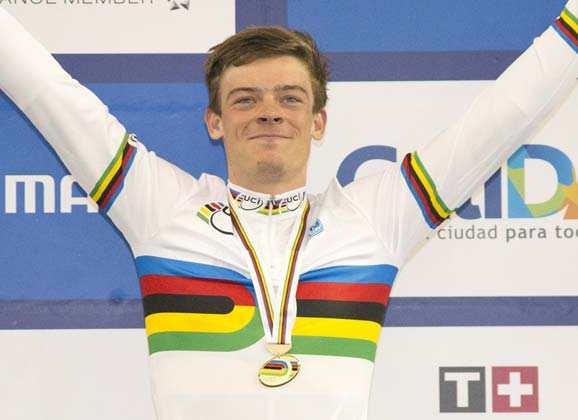On day one of the 2014 track cycling world championships in Cali, Colombia, the Australian pursuit team successfully defended its title. The following day Alex Edmondson qualified fastest in the individual pursuit. The 20-year-old is quickly ticking items off his to-do list. Earlier this year he won the national title in the individual pursuit and then it was off to South America where he would contest the pursuit events as well as the Madison.
The South Australian returned from the world championship with two gold medals: first in both the team pursuit and individual pursuit… but out of the medals in the Madison.
The weekend after his return from Colombia, he teamed up with Glenn O’Shea for the Bendigo Madison and finished third. Before that race, he spoke with RIDE about his experience in Cali and how happy he is to be fulfilling his dreams as a cyclist. Here is a transcript of that exchange…
[Click here for results from the world championships of 2014.]
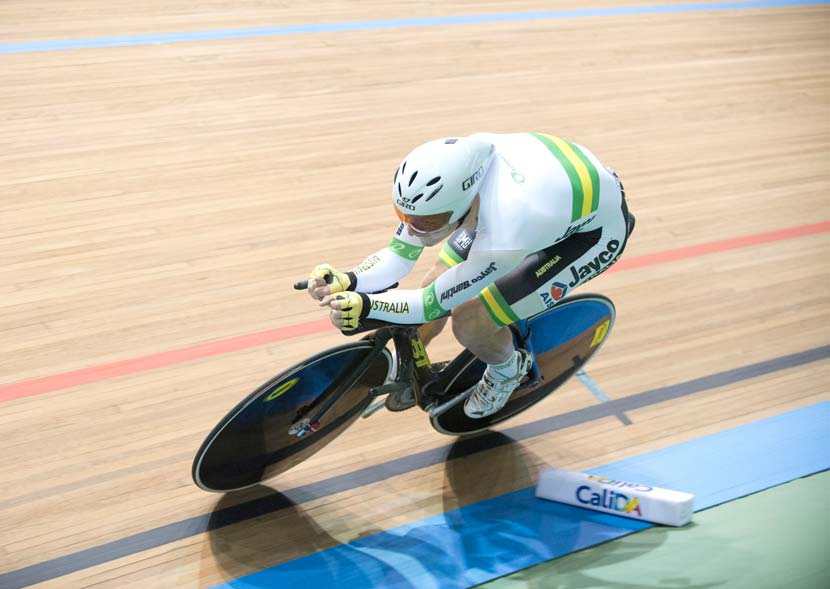
Alex Edmondson on his way to victory in the 4,000m individual pursuit.
Photo: Graham Watson
Alex Edmondson Q&A
– By Rob Arnold
RIDE: Congratulations on all that you achieved in Colombia. It’s been a busy few days for you. Let’s start this chat by saying: ‘Welcome home’…
Alex Edmondson: “Thanks a lot but, really, I haven’t gotten ‘home’ just yet. I managed to make it all the way back to Australia but I arrived from Cali, Colombia and landed in Melbourne, got straight in the car and drove up to Bendigo. I’m currently sitting in a hotel room before the big annual Bendigo Madison weekend.”
…So you can make amends for what happened in the Madison last Sunday [in Colombia]. Can you explain what happened in that race – it was confusing for many including, it would seem, the commissaires and riders who were at the track in Cali.
“A lot of people didn’t really know what happened.
“We went in with a plan to hit out early. If we could, we had hoped to try and take a lap in the early part of the race. If not, then we were to sit back and see if we could leave it for the last part.
“We [the Australian pair, Edmondson and O’Shea] managed to get a lap within the first eight or nine laps so everything was going picture perfect until about 100 laps to go. I’m not really sure why but my lights went out and from there it became more of a survival race than one in which I could think about the victory.
“Of course that’s very hard to take because we had been in such a good position and all we really had to do was defend – but that’s bike racing: you lose a hell of a lot more races than you win.
“Glenn was going absolutely amazingly, as always, so it was a bit disappointing on my behalf to not be able to ride how I would have liked but, hey… that’s life. You can’t win ’em all.”
And you had won a few before the Madison. Did the efforts in the team pursuit and individual pursuit cost you?
“Of course it all played a part. Doing the two events beforehand took some out of my legs but another big part of it was that I just don’t really do enough training on my points race/Madison bike; that’s mainly because, in the Australian team, there’s a strong focus on the team pursuit as that’s an Olympic event and it’s something that we Australians put on a high pedestal.
“With that said, there are no excuses. I just didn’t have it and I think the Europeans really showed us how handy they are in a bunch race environment on the track.”
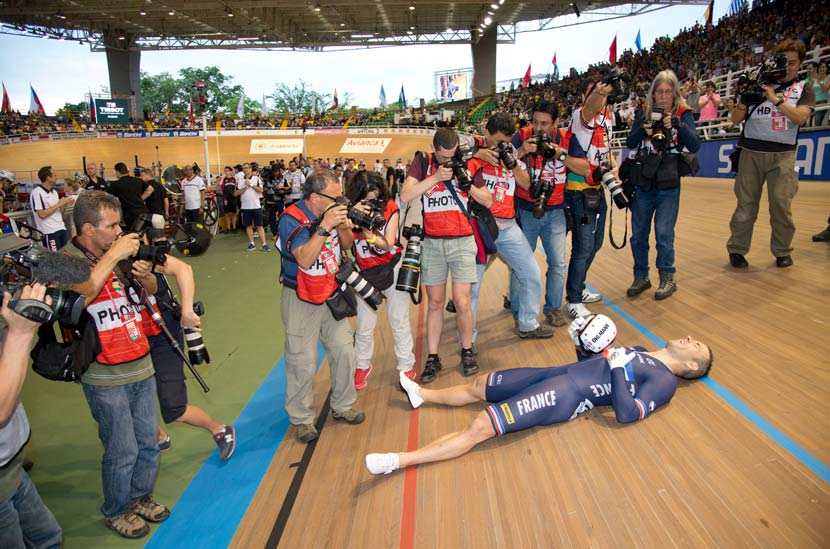
François Pervis won the ‘kilo’, keirin and sprint in Cali. He recognises his achievement after his third world championship victory of 2014…
Photo: Graham Watson
Let’s trace back a little bit in the worlds because the meeting tended to slip under the radar a little… but, from what I understand, the velodrome in Cali is an outdoor one – is that correct?
“Yeah, the velodrome over there is amazing. You can either have an outdoor or an indoor track but this one was a mix.
“In Cali it’s a wooden surface and the track has really long straights and short, tight bends. There is a roof but on the sides there are no walls. The strangest thing is that you could be riding around doing an effort and look up to see trees or the mountains in the background.
“Normally when you go to a track race, you know it’s going to be fast. It’s going to be hot. You know there’s not going to be a lot of wind. But in Cali there was much more to think about. ‘Is there wind?’ ‘Is there rain?’
“All of a sudden there could be wind blowing in and one day it was raining and the track was flooded – nobody was able to ride.
“Colombia is just such an amazing place. There are so many people and they’re all so friendly and happy to talk to you but there is also a huge amount of crime in that country. And because of that, whenever we were on our way to the velodrome, the bus had a police escort. If we caught a taxi, we had to tell the police and then they followed behind on a motorbike…
“We never had any troubles at all so it was such a cool thing – to be able to go there and witness such a different country to what I’m used to.”
You did a 3:57 in the final of the team event. That’s pretty fast…
“Yeah it is. And we knew we had to go quick but I’m not sure if we thought we could do a 3:57 especially with the wind having an influence. It was amazing to be able to qualify in 4:01 and only just make it into the gold medal ride off. We then went out and rode the 3:57 to win the title – it was unbelievable.”
Let’s talk through the order: who was the starter?
“In the qualifying the sequence was Glenn O’Shea, then me, then Mitch Mulhern and then Miles Scotson.
“In the final it was Glenn, me, Luke Davison and Mitch Mulhern. In that ride we had Davison do a two-and-a-half lap peel for his second turn and then that was it for him. He did a great job and that’s what really set us up. From then on – from the two kilometre mark – we hit the front and, thank god, we held on and crossed the finish line to win.
“It was a predetermined tactic but it did leave three of us out there for half of the race. It was a scary plan and one of those ones where you’ve just gotta hope that it all works. If someone crashes or punctures in that last kilometre, then it’s all over.”
It was Tim Decker’s call to ride that way so when did he make the plan and nut out the schedule with Luke’s long effort?
“That was pretty much just before the final. The great thing about Tim is that he’s so smart with that sort of thing. He knew exactly how to get the best out of everyone.
“Team pursuiting these days has come down to having to work out how much a rider can do. To win, you’ve got to be able to get everyone to use up absolutely everything they have. We had lots of different tactics of how we were going to do that and Tim pulled it all together and it is the reason why we are world champions – it’s because of Tim Decker.
“We were up against the Danish team in the final but I think everyone anticipated that it was going to be Australia vs GB because it’s been that way for the last nine years – except for when Denmark actually won it in 2008. I’m not sure what happened to the Brits but as many would have seen in the news after the championships they got a bit slammed for how they raced. But the thing about the Poms is that they’re always going to come out firing again. When you get knocked down, you work harder to come back so we can never discount the Brits – come the Comm Games and Rio [2006] they’ll be on fire again.”
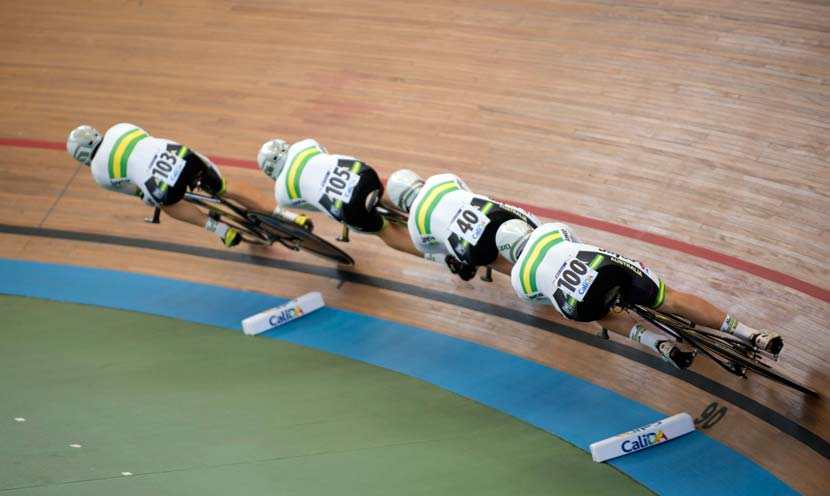
Edmondson, at the rear, on day one of the championships.
Photo: Graham Watson
It’s clear that you’re a classy bike rider but I have to say that when I saw you’d won the individual pursuit I was thrilled… but a little bit surprised. How was your emotion – were you expecting to win it?
“The weird thing is that I wasn’t actually meant to start the individual pursuit because of the new rules. To be able to race the world championships you’ve got to qualify through different races in the lead-up. When we got to Cali, I didn’t have enough points to be able to race but luckily I managed to get a wildcard entry.
“Going from the team pursuit the night before – and feeling so ecstatic and wanting to live that moment – was a good thing but it wasn’t easy. I ended up not getting to sleep until about three o’clock in the morning, so I only got about five hours sleep. Then I had to sort myself out for an individual pursuit at the worlds.
“I didn’t really know how I was going to go.
“I went in there thinking, ‘I’ve just got to do my best…’ and Tim knew that. He put me on a schedule of a 4:22 and I came away with a 4:21.
“I was the second heat of 10 so it was a long, nervous wait. To see no one get the better of me was great. I was pretty shocked. I’d qualified fastest – only by 0.2 – but I knew it was going to be such a hard challenge against the Swiss guy Stefan Kueng.
“I went out hard in the final and managed to hold on and just get there first by 0.4 of a second. All you’ve got to do to win is be the first across the line and I managed to do that.
“It’s always been a dream of mine to do well and these last couple of years have given me some extraordinary experiences. I managed to be the Australian IP champion this year and now I’m the world champion… even a week later, it doesn’t even feel like that could have happened. But it is real.”
When people hear ‘Colombia’, there’s an assumption that you’re going to be racing at over 2,000 metres or some significant altitude. How high is the Cali track?
“That’s a bit of a trick isn’t it? We went to Mexico to prepare and trained at around 1,900 metres but then we got to Cali and that’s only around 900m – and that’s not too far off Canberra’s altitude [580m].
“We didn’t really feel too much of the altitude in Cali. It was more about trying to get used to riding the team pursuit with a five-spoke wheel and a headwind or crosswind.”
Did that influence you in the individual pursuit as well?
“An interesting thing was that when I rode my individual to qualify there actually wasn’t much wind around. And because I’m not swinging up or not riding centimetres away from the wheel in front of me, it was the first time I’d actually ridden double disc wheels. Tim said, ‘Well, what do you want to do?’ And I said, ‘Well, we may as well try…’ and luckily it all paid off.
“The double discs are meant to be a lot faster than riding a five-spoke front.
“When you’ve got a disc on the front the wind is a big factor, it makes the bike twitch around and hard to control. With a five-spoke, like I often use in the bunch races on the track, it’s much easier to ride – it’s lighter to manoeuvre around. That’s why we went with that set up for the team pursuit; it’s a little bit slower but it’s a lot safer.”
It’s almost like when you watch a MotoGP and the pre-race decision is about wet or dry tyres…
“Yeah, that’s the thing: a wrong choice of equipment does have an influence. But the thing is, you’ve got to be confident in what we were doing and we all had belief in what we used and that’s why we came away as world champions.”
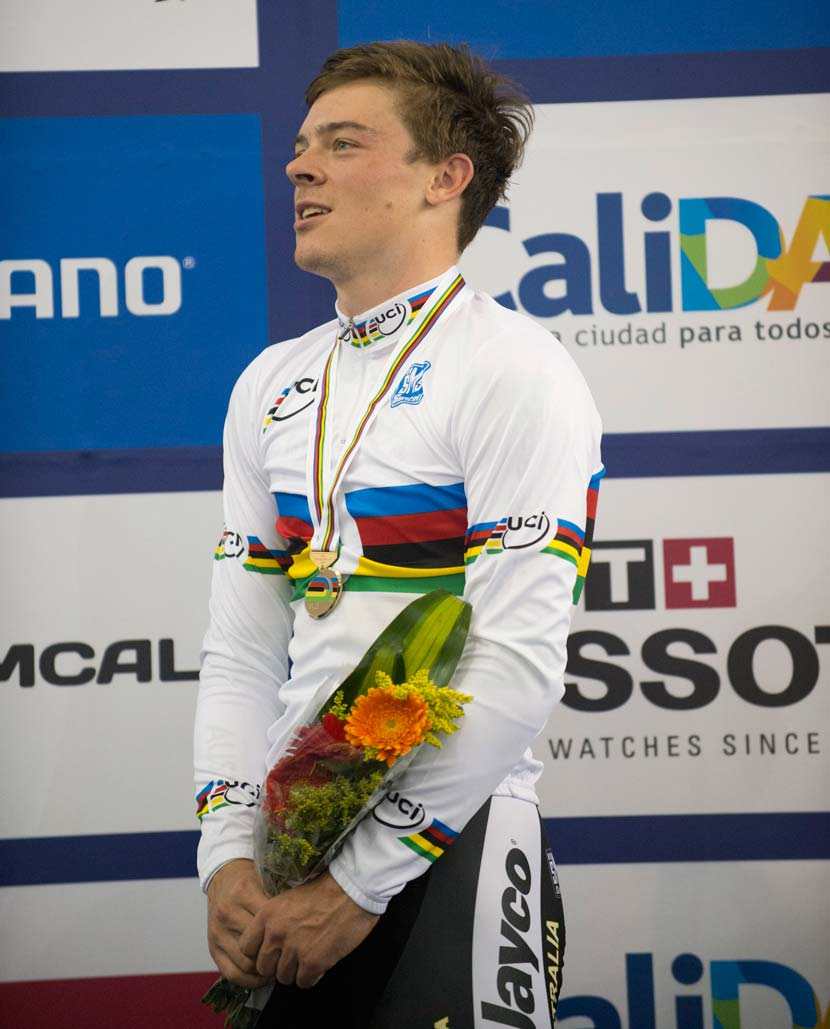
Satisfaction… a second world title in two days for Edmondson.
Photo: Graham Watson
Matt Gilmore is part of the Australian team’s coaching staff. How was he to work with in the lead-up to the Madison?
“It’s really good to be able to draw on his experience. He’s raced at the hardest level and achieved so much in his career so it’s good to have someone like him around when I’m swapping from one bike to another.”
Gilmore is from Tasmania but he’s also raced for Belgium [winning a world title and an Olympic medal for that country]. When you had your lapse in the Madison and the Belgians were going well, was he quite animated?
“Well, it was interesting because they initially gave the Belgians the win but then they reviewed the race afterwards and it turns out that they hadn’t taken a lap at the time the Spaniards did. All of a sudden the Belgians went from winning to fourth…
“It was an interesting end to the night: we were packing our bags to get ready for the early flight home and, all of a sudden, the announcement came over the loudspeaker. The Belgians had gone from absolutely cheering a victory to not even being on the podium.”
It’s a bit of a shame isn’t it. Track cycling is already struggling to get traction in the media and then it becomes confusing even to the people who know the sport well…
“Yeah. And there were a lot of other times when people were complaining about the commissaires and that sort of thing but at the end of the day, as a rider, I’ve just got to deal with what happens – I can’t do much about it.”
Aside from police escorts through traffic and a couple of rainbow jerseys to take home, what was the highlight of the championship from a trackside perspective?
“The atmosphere in the velodrome! When we were in London for the Olympics, it was madness: it was so exciting that it gave me constant goosebumps… and in Colombia it was similar.
“I had butterflies in my stomach when the Colombian [Edwin Avila] won the points race. It was the closest thing I’ve seen since the Olympic Games. That was the highlight: the crowd going nuts about that win… or when the Colombian [Fabian Puerta] got second in the keirin – they were going absolutely ballistic!”
For a 20-year-old you’ve seen a lot of the world because of the bike, haven’t you?
“Yeah, I’ve been so lucky. I’ve been able to travel to so many different places. Even last year, before I went to Azerbaijan I didn’t really know where it was on the map. All of a sudden I was on a flight there…
“There are these sorts of things that remind me how lucky I am.
“I’ve been to Belorussia and Kazakhstan and Mexico… and I’m able to live in Adelaide and spend time in Belgium and Italy. There aren’t too many 20 year olds who have gotten to see the world like I have.”
There are two options aren’t there: get homesick or relish the travel.
“Yep. Of course you’re going to miss your family and friends and that sort of thing but at the same time it’s pretty cool. I’m 20. I’m living away from home. I’m getting paid to ride my bike. I get to wear the green and gold in some of the most amazing countries. I get to see different cultures and different ways of life.
“I’ve only been in the national team for three and a bit years but the experiences and things I’ve been able to witness are things I’ll never forget.
“Another thing is to be able to do it with [sister] Nettie there makes it so much better. All the other athletes have got to think about how to make their family time, on Skype or expensive phone calls, but all I’ve got to do is walk down the hallway and go and see my sister. That’s cool.”
– Interview by Rob Arnold
Click here for results from the world championships of 2014.
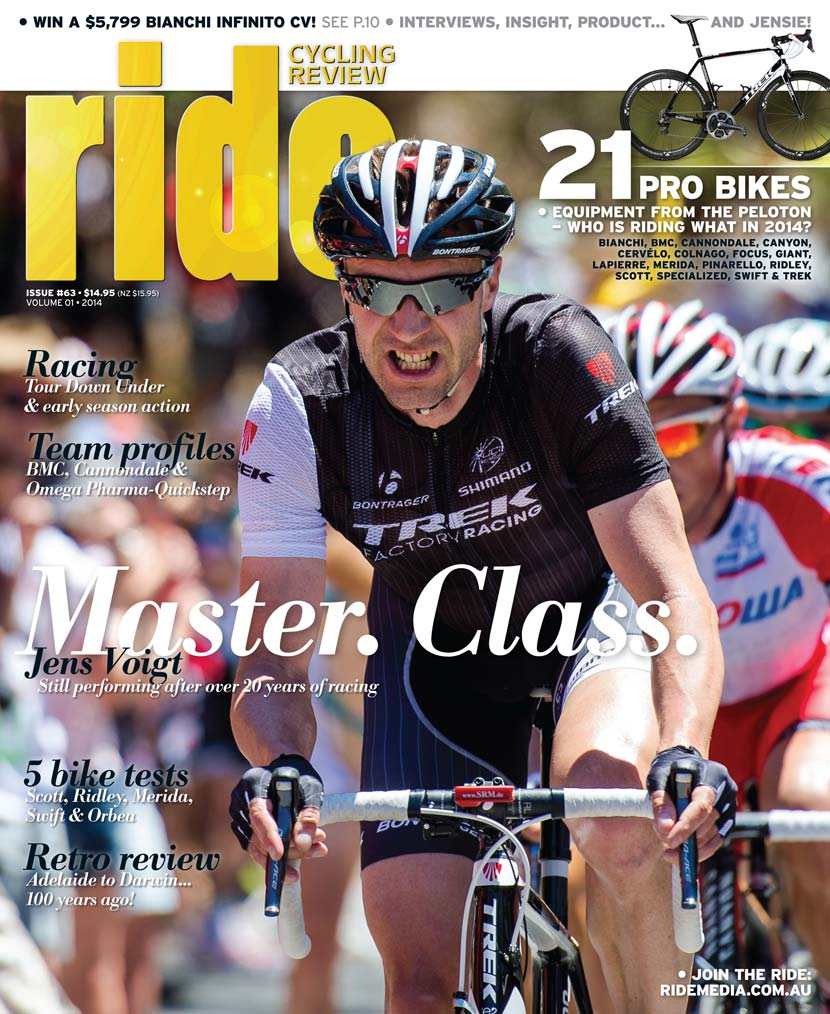
RIDE Cycling Review is published four times a year. The first issue of 2014 is now on sale around Australia.


